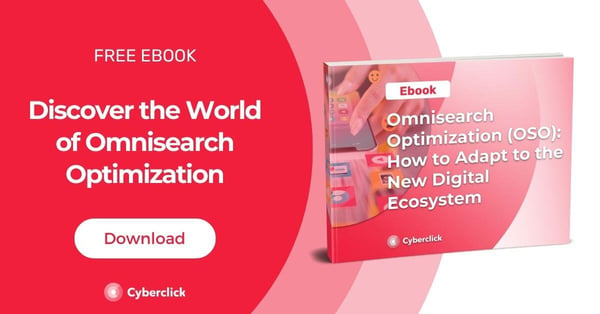If your website traffic has been decreasing lately, you’re not alone, and no, you’re not necessarily doing anything wrong. AI is changing the way people search for and find information. Platforms like ChatGPT, Perplexity, and even Google itself, with its new AI Overviews, are shaking up the search landscape. But that doesn’t mean SEO is dead--far from it.
AI is forcing SEO to evolve, but it’s also opening up new opportunities, especially for marketers who are willing to rethink their strategies and tap into the power of AI. Let’s break down what’s happening, why it matters, and how you can use AI to get better SEO results.

What AI Is Doing to SEO Right Now
SEO is no longer just about Google. Users are searching for information across platforms like Instagram, TikTok, YouTube, Reddit, and increasingly through AI tools like ChatGPT. As a result, we’re increasingly moving from SEO to OSO (omnisearch optimization).
Google’s AI Overviews, those little blurbs that summarize content right at the top of your search results, are now answering questions without sending them to your site. That has led to fewer website visits, especially for those that have more informational or educational content. Thus, the visits you do get are more likely to be high intent.
So, what can you do about it?
Implementing AI into Your SEO Strategy
Here’s what we know so far: we don’t have full visibility into how tools like ChatGPT or Perplexity pick which sources to cite. Keeping that in mind, Google has said the best way to show up in AI Overviews is…to keep doing good SEO.
But what does all this mean exactly? Below are a few practical things you can do to boost your SEO.
1. Focus on Long-Tail Keywords
AI users are asking full, natural-language questions. That’s great news if you’ve already been optimizing for long-tail keywords. If not, now’s the time to start. Tools like AnswerThePublic or AlsoAsked can help you find the kinds of queries people are actually typing—or saying—into AI tools.
2. Make Your Content Clear and Useful
AI models and search engines alike prefer content that’s easy to understand. That means short paragraphs, clear structure, and direct answers. Think about the kind of content you’d want a chatbot to draw information from.
3. Publish Original Insights
AI can summarize anything. What it can’t do is think like you. Content that brings fresh perspectives, real-world experience, or first-party data is more likely to get noticed, not just by readers, but by AI systems looking for credible sources.
Pros and Cons of AI-Driven SEO
There are many benefits to applying AI to your SEO strategies, including:
-
Better-quality traffic: AI might reduce overall clicks, but it’s doing some filtering for you. Visitors who still choose to click through are more likely to convert.
-
More chances to build authority: If your content gets cited by AI tools, your brand visibility and credibility can grow faster.
That being said, some challenges could present themselves. These may include:
-
Difficulty in reverse-engineering algorithms: Unlike traditional SEO, we don’t know what AI models are using as their criteria for selecting sources.
-
Rethinking content creation: It’s no longer about just writing for Google. Now you’re also writing for AI models. These models process information differently from humans.
Top AI Tools for SEO
AI can save time, but it shouldn’t replace your brand voice. Use it to support your SEO strategy, not run it. Below are a few tools we recommend.
Copymate
Copymate is a content generator built specifically for SEO. It uses GPT-4 to help you create blog posts that align with your brand tone and optimize for search. Plus, if you use WordPress, it plugs right in.
aiKPT
aiKPT is a great tool for creating content, but what’s really useful is its keyword extraction feature. Upload your competitors’ articles, see which terms they’re ranking for, and add those to your own strategy.
Serpstat
This tool goes beyond content creation. Serpstat has an AI content detector that helps you see whether a piece sounds too robotic. Google doesn’t ban AI content, but poorly written copy that fails EEAT (Experience, Expertise, Authoritativeness, Trustworthiness) will struggle to rank well. Use Serpstat to make sure your content still feels human.
In Conclusion
SEO is evolving due to AI, and just like with any big shift, the brands that stay curious, flexible, and focused on providing real value are the ones that will come out ahead.
All in all, think long-tail keywords. Write for humans and AI. Use tools to save time, but don’t let them replace the strategic thinking and originality that only your team can bring to the table.
Responsable de la estrategia de contenidos y visibilidad en Cyberclick, con enfoque Allbound y especialización en posicionamiento SEO, GEO y automatización con IA. Gestión avanzada del CRM con HubSpot: base de datos, workflows, lead nurturing, scoring y reporting. Experiencia en marketing digital, comunicación corporativa y periodismo, uniendo estrategia, creatividad y tecnología para captar y convertir leads cualificados.
Responsible for content and brand visibility strategy at Cyberclick, with an Allbound approach and specialization in SEO, GEO (Generative Engine Optimization), and AI-powered automation. Advanced HubSpot CRM management: database segmentation, workflows, lead nurturing, scoring, and reporting. Background in digital marketing, corporate communications, and journalism—combining strategy, creativity, and technology to attract and convert qualified leads.






Leave your comment and join the conversation